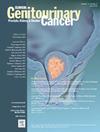原发性腹膜后淋巴结切除术病理阴性(pN0)患者的长期临床疗效。
IF 2.3
3区 医学
Q3 ONCOLOGY
引用次数: 0
摘要
背景:接受腹膜后淋巴结清扫术(primary retroperitoneal lymph node dissection,ppRPLND)治疗早期睾丸癌且腹膜后未发现癌症(pN0)的患者被认为预后极佳。然而,一些患者会出现复发,这可能是由于目前的分期方法存在局限性。我们的目的是描述一组在腹膜后淋巴结清扫术(pRPLND)中发现为 pN0 的患者的长期预后和复发模式,以确定改进诊断方法和优化患者选择的机会:我们回顾了我们的前瞻性数据库,该数据库收录了2000年1月1日至2023年9月30日期间在我们的三级癌症中心接受pRPLND治疗的非肉芽肿性生殖细胞肿瘤患者(n = 628)。我们排除了282例结节阳性病理患者,最终分析队列为346例患者。我们的主要结果是无复发生存率(RFS)。次要结果包括复发时间和复发部位:在 346 例病理结果为 pN0 的患者中,23 例复发,2 年无复发生存率为 93%(95% 置信区间:90, 96)。大多数复发(70%)发生在肺部,且发生在 pRPLND 后 6 个月内。43%的患者在复发时血清肿瘤标志物呈阳性。所有复发患者都接受了挽救性化疗;6 名患者需要进行额外的手术治疗。没有睾丸癌相关死亡病例:结论:pN0 pRPLND病理患者的两年RFS非常好。所有复发都在腹膜后以外,这表明手术时存在亚临床远处转移,以及双侧模板切除的益处。诊断方法的改进可能有助于在进行pRPLND之前更好地识别腹膜后或腹膜外疾病患者,从而为治疗决策提供指导。本文章由计算机程序翻译,如有差异,请以英文原文为准。
Long-term Clinical Outcomes of Patients With Negative Pathology (pN0) at Primary Retroperitoneal Lymph Node Dissection
Background
Patients who undergo primary retroperitoneal lymph node dissection (pRPLND) for early-stage testicular cancer and have no cancer (pN0) found in the retroperitoneum are believed to have an excellent prognosis. However, some experience relapse, potentially due to limitations of current staging methods. We aim to describe long-term outcomes and relapse patterns among a contemporary cohort of patients found to be pN0 at pRPLND to identify opportunities for improved diagnostic approaches and optimal patient selection.
Methods
We reviewed our prospectively maintained database for patients who underwent pRPLND for nonseminomatous germ cell tumors at our tertiary cancer center during the period from January 1, 2000, through September 30, 2023 (n = 628). We excluded 282 patients with node-positive pathology for a final analytic cohort of 346 patients. Our primary outcome was recurrence-free survival (RFS). Secondary outcomes included timing and location of recurrence.
Results
Of 346 included patients with pN0 pathology, 23 experienced relapse with a 2-year RFS rate of 93% (95% confidence interval: 90, 96). Most recurrences (70%) occurred in the lungs and within 6 months of pRPLND. Serum tumor markers were positive in 43% of patients at the time of relapse. All patients who relapsed were treated with salvage chemotherapy; 6 patients required additional surgical procedures. There was no testis cancer–related deaths.
Conclusions
Two-year RFS for patients with pN0 pRPLND pathology is excellent. All recurrences were outside of the retroperitoneum, suggesting subclinical distant metastases at time of surgery and the benefits of a bilateral template dissection. Improved diagnostics may help better identify patients with disease within or outside of the retroperitoneum prior to pRPLND, helping guide treatment decisions.
求助全文
通过发布文献求助,成功后即可免费获取论文全文。
去求助
来源期刊

Clinical genitourinary cancer
医学-泌尿学与肾脏学
CiteScore
5.20
自引率
6.20%
发文量
201
审稿时长
54 days
期刊介绍:
Clinical Genitourinary Cancer is a peer-reviewed journal that publishes original articles describing various aspects of clinical and translational research in genitourinary cancers. Clinical Genitourinary Cancer is devoted to articles on detection, diagnosis, prevention, and treatment of genitourinary cancers. The main emphasis is on recent scientific developments in all areas related to genitourinary malignancies. Specific areas of interest include clinical research and mechanistic approaches; drug sensitivity and resistance; gene and antisense therapy; pathology, markers, and prognostic indicators; chemoprevention strategies; multimodality therapy; and integration of various approaches.
 求助内容:
求助内容: 应助结果提醒方式:
应助结果提醒方式:


